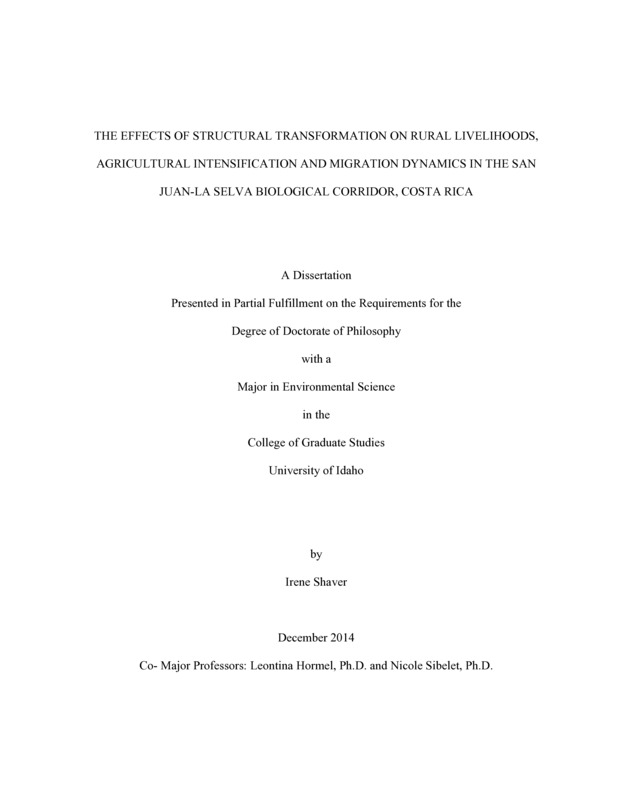THE EFFECTS OF STRUCTURAL TRANSFORMATION ON RURAL LIVELIHOODS, AGRICULTURAL INTENSIFICATION AND MIGRATION DYNAMICS IN THE SAN JUAN-LA SELVA BIOLOGICAL CORRIDOR, COSTA RICA
Shaver, Irene. (2014). THE EFFECTS OF STRUCTURAL TRANSFORMATION ON RURAL LIVELIHOODS, AGRICULTURAL INTENSIFICATION AND MIGRATION DYNAMICS IN THE SAN JUAN-LA SELVA BIOLOGICAL CORRIDOR, COSTA RICA. Theses and Dissertations Collection, University of Idaho Library Digital Collections. https://www.lib.uidaho.edu/digital/etd/items/shaver_idaho_0089e_10445.html
- Title:
- THE EFFECTS OF STRUCTURAL TRANSFORMATION ON RURAL LIVELIHOODS, AGRICULTURAL INTENSIFICATION AND MIGRATION DYNAMICS IN THE SAN JUAN-LA SELVA BIOLOGICAL CORRIDOR, COSTA RICA
- Author:
- Shaver, Irene
- Date:
- 2014
- Keywords:
- Agricultural Intensification Biodiversity Conservation Costa Rica Family Farmers Migration Rural Development
- Program:
- Environmental Science
- Subject Category:
- Sociology; Political Science; Environmental studies
- Abstract:
-
The focus of this dissertation is to understand the process and implications of capitalist incorporation and agrarian change in the frontier region of Northern Costa Rica within the San Juan-La Selva Biological Corridor. Within this larger narrative the analysis focuses on three major themes: agricultural intensification, migration dynamics and family farmers. Data utilized in this analysis includes: community workshops, 35 interviews with government officials, agribusinesses, producer organizations and large landholders, a randomized household survey of 139 households, grey literature, census data and extended participant observation. Key findings are as follows: Structural adjustment reforms have driven a trend of agricultural intensification through the expansion of pineapple, which has led to homogenization of the agricultural matrix's land cover. Pineapple expansion has also increased regional economic dependency on large agribusinesses, created incentives for land turnover, and has drawn labor migrants. These parallel social-ecological changes caused by the expansion of pineapple, undermine the biodiversity of the agricultural matrix and do not facilitate development of the agricultural sector in a way that is inclusive of the diversity of farmers present in the study region. Migrants to this region are largely marginalized populations with low socio-economic indicators of wealth and quality of life. International and internal migrants have come in two general waves; early migrants were seeking land and later migrants were seeking labor opportunities. The earliest migrants in the eldest life stage are faring the worst on the frontier and have not been able to capitalize on their land resources to tangibly improve their quality of life. The family farmer is in peril in this landscape and is primarily participating in traditional domestic markets. Collective organization and state help are critical factors that allow family farmers to persist and prosper in the political economic and eco-regional context of the frontier. This dissertation provides a model to inform future analysis of coupled human-ecological systems that accounts for social, political and ecological change as coupled parallel processes.
- Description:
- doctoral, Ph.D., Environmental Science -- University of Idaho - College of Graduate Studies, 2014
- Major Professor:
- Hormel, Leontina; Sibelet, Nicole
- Committee:
- Rudzitis, Gundars; Vierling, Lee; Finegan, Bryan
- Defense Date:
- 2014
- Identifier:
- Shaver_idaho_0089E_10445
- Type:
- Text
- Format Original:
- Format:
- application/pdf
- Rights:
- In Copyright - Educational Use Permitted. For more information, please contact University of Idaho Library Special Collections and Archives Department at libspec@uidaho.edu.
- Standardized Rights:
- http://rightsstatements.org/vocab/InC-EDU/1.0/

